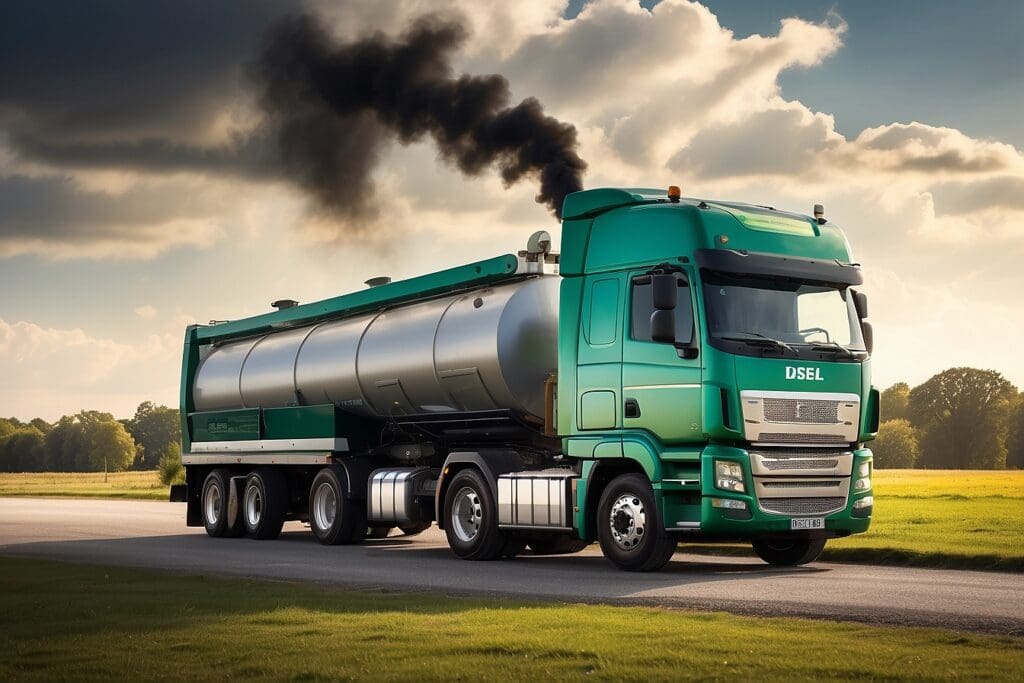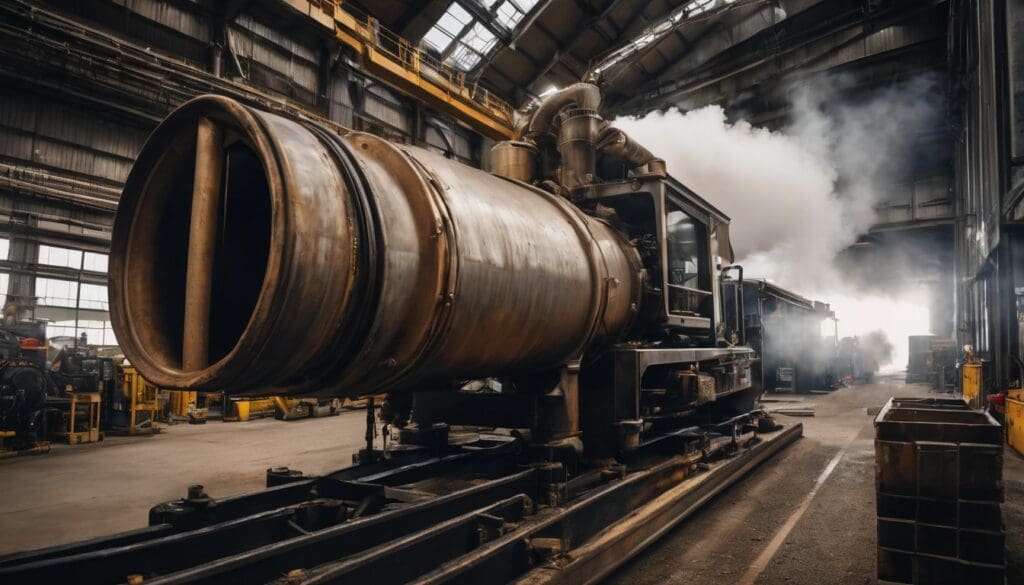Many of us are all too familiar with the pressing challenge of curbing harmful emissions from diesel engines. It’s a shared struggle, and whether it’s chatting over a cuppa or scouring through reports, we’re constantly reminded that heavy-duty vehicles are a significant contributor to greenhouse gas emissions.
In our forthcoming article, we’ll be exploring both practical and innovative strategies to effectively reduce those stubborn pollutants. So keep your eyes peeled for some truly enlightening tips that could make all the difference!
Key Takeaways
- Employing advanced technologies like Exhaust Gas Recirculation and Diesel Particulate Filters is crucial for significantly cutting down nitrogen oxides and particulate matter from diesel engine emissions.
- Integrating clean agriculture practices with decarbonised liquid fuels can vastly improve air quality by reducing harmful pollutants produced by heavy-duty vehicles in farming.
- Alternative fuels, such as biodiesel and renewable diesel, offer cleaner combustion, thus playing a pivotal role in minimising the environmental impact of diesel engines.
- Innovations like nanofluids and Water-in-Diesel techniques demonstrate great potential for enhancing fuel efficiency and reducing emissions during the combustion process.
- To ensure continued reduction in diesel pollution, embracing new developments in decarbonised fuels, hybrid technology, and electrification of powertrains is essential for the sustainability of heavy-duty transport systems.
Understanding Diesel Engine Emissions

Diesel engine emissions have significant impacts on the environment and human health. Cold start conditions can exacerbate emission levels due to incomplete fuel combustion. Understanding these mechanisms is crucial in developing effective strategies for reducing emissions in diesel engines.
Impacts of Diesel Exhaust
We know that the fumes billowing out of diesel engines carry more than just a foul smell; they have real consequences for our health and the environment. These exhaust emissions are filled with tiny particles and harmful gases like nitrogen oxides and carbon emissions which can infiltrate our lungs, contribute to respiratory diseases, heart conditions, and even worsen asthma.
Each time heavy-duty vehicles roll by, emitting their diesel pollution, we’re reminded of the urgent need for diesel engine emissions reduction. Not only do these pollutants affect us directly but they also play a significant role in climate change as greenhouse gas emissions from diesel engines trap heat in our atmosphere.
It’s crucial for strategies targeting idle reduction to be implemented effectively if we want to see positive changes in the air quality around us and slash the environmental impact of these engines.
Emission Mechanisms under Cold Start Conditions
During cold start conditions, diesel engines produce higher emissions due to incomplete fuel combustion and inefficient catalytic converter performance. This occurs because the engine and its emission control system are not yet at optimal operating temperatures.
As a result, particulate matter, nitrogen oxides, and hydrocarbons are released into the atmosphere in larger quantities during this phase.
To address the issue of increased emissions from cold starts, it’s important to implement technologies that can improve the warm-up process of both the engine and its emission control components.
Strategies to Reduce Emissions from Diesel Engines
Advanced technologies and fuel additives are being used to reduce emissions from diesel engines, while clean agriculture practices and the use of alternative fuels are also being explored as effective strategies for emission reduction.
Nanofluids and water-in-diesel technologies are also considered promising in this regard.
Advanced Technologies
We can employ advanced technologies to reduce emissions from diesel engines. These include:
- Exhaust Gas Recirculation (EGR): This technology reduces nitrogen oxide emissions by recirculating a portion of an engine’s exhaust gas back into the combustion process.
- Selective Catalytic Reduction (SCR): By injecting a liquid reductant agent into the exhaust stream, SCR converts nitrogen oxides into harmless nitrogen and water.
- Diesel Particulate Filters (DPF): These filters trap particulate matter, such as soot, from the exhaust gases, reducing harmful emissions.
- Clean Diesel Technology: Utilising low-sulphur diesel fuel combined with advanced engine and emission control systems to minimise pollutants.
- Diesel Exhaust Fluid (DEF): By injecting DEF into the exhaust stream, it breaks down harmful nitrogen oxides into harmless nitrogen and water vapour.
- Nanofluids: These innovative coolants improve heat transfer in engine components, increasing fuel efficiency and reducing emissions.
Clean Agriculture
Clean Agriculture offers environmentally friendly practices that focus on reducing emissions from diesel engines used in farming. Implementing clean agriculture involves using advanced technologies and sustainable farming methods to minimise the environmental impact of diesel exhaust.
By adopting clean agriculture, farmers can reduce nitrogen oxide emissions and particulate matter from heavy-duty diesel engines, contributing to cleaner air and healthier ecosystems.
This approach aligns with our commitment to conservation and supports our goal of reducing diesel pollution in agricultural settings while ensuring efficient fuel economy for heavy-duty vehicles.
Embracing clean agriculture is essential for a sustainable future.
Alternative Fuels
Using alternative fuels in diesel engines is a crucial strategy for reducing emissions. These fuels, such as biodiesel and renewable diesel, offer significant environmental benefits by producing lower levels of harmful pollutants like nitrogen oxide and particulate matter.
By utilising decarbonised liquid fuels, we can actively contribute to mitigating the impact of diesel pollution on our environment. Embracing alternative fuels also aligns with the goals of clean agriculture, promoting sustainable practices that support conservation efforts.
Furthermore, the use of alternative fuels in heavy-duty vehicles can play a pivotal role in achieving idle reduction strategies. This approach not only minimises particulate emissions from diesel engines but also fosters a more eco-friendly transportation industry.
Fuel Additives
Fuel additives are an effective way to reduce emissions from diesel engines. By adding specific chemicals to the fuel, these additives can minimise harmful pollutants such as nitrogen oxides and particulate matter.
Additionally, fuel additives can improve overall engine performance and efficiency, contributing to a cleaner and more sustainable operation of heavy-duty vehicles.
Incorporating decarbonised liquid fuels with the right blend of fuel additives is crucial for reducing diesel pollution. These solutions not only help in decreasing emissions but also assist in promoting clean agriculture practices by lowering the environmental impact of heavy-duty diesel engines.
Nanofluids
Nanofluids, which are engineered by dispersing nanoparticles in a base fluid, have shown potential for reducing emissions in diesel engines. These nanofluids can improve the thermal conductivity and heat transfer properties of the coolant, leading to more efficient engine operation.
By enhancing the cooling capabilities, nanofluids can help in reducing nitrogen oxide emissions produced during combustion.
Moreover, the use of nanofluids can contribute to better fuel economy by optimising engine temperature regulation. This innovative approach aligns with our shared goal of sustainable practices and environmental conservation as we strive to reduce diesel pollution and its impact on the environment.
Water-in-Diesel
Transitioning from the use of nanofluids to another effective strategy for reducing diesel engine emissions, let’s explore the concept of “Water-in-Diesel.” Introducing small amounts of water into the diesel combustion process can effectively reduce nitrogen oxide (NOx) and particulate matter emissions.
This approach involves emulsifying water into diesel fuel, leading to improved atomisation during combustion and subsequently reducing peak flame temperatures. By implementing this method along with other emission reduction strategies, heavy-duty vehicles can play a significant role in lowering their environmental impact.
Implementing Water-in-Diesel provides an innovative yet practical solution that aligns with our goal of minimising diesel pollution while exploring alternative fuels for heavy-duty engines.
Key Considerations
When considering strategies to reduce emissions from diesel engines, it’s important to explore the benefits of decarbonised liquid fuels and their potential impact on lowering pollution levels.
Additionally, the future of diesel engines and how advancements in technology could further contribute to emission reduction is worth noting.
Benefits of Decarbonised Liquid Fuels

Decarbonised liquid fuels offer a sustainable solution for reducing emissions from diesel engines. By using these cleaner fuels, heavy-duty vehicles can significantly decrease nitrogen oxide and particulate matter emissions, contributing to improved air quality and reduced environmental impact.
Additionally, decarbonised liquid fuels can be seamlessly integrated into existing infrastructure, making it an accessible and practical choice for environmentally conscious individuals seeking to support conservation efforts.
Employing decarbonised liquid fuels in diesel engines not only reduces harmful emissions but also enhances the overall sustainability of transportation systems. These advanced fuel options align with the goals of clean agriculture initiatives, providing a viable path towards lowering diesel pollution while supporting eco-friendly practices within the industry.
The Future of Diesel Engines
Diesel engines are evolving to meet stricter emission regulations and environmental demands. Innovations in engine design, cleaner fuels, and advanced exhaust after-treatment systems will play a crucial role in reducing nitrogen oxide emissions from heavy-duty vehicles.
Additionally, the integration of hybrid technology and electrification into diesel powertrains shows promise for further reducing pollution while maintaining efficiency.
As we look ahead, the future of diesel engines is shaped by sustainable practices that prioritise environmental conservation without compromising performance or reliability. These advancements represent a commitment to mitigating diesel exhaust emissions and fostering a greener planet for generations to come.
Conclusion
In conclusion, emissions from diesel engines can be reduced through the use of advanced technologies and alternative fuels. Clean agriculture practices also play a significant role in decreasing nitrogen oxide emissions.
Combining these strategies and considering the benefits of decarbonised liquid fuels can contribute to a cleaner future for heavy-duty vehicles. It’s vital to embrace these solutions for a more sustainable environment and healthier communities.
FAQs
1. What are the key strategies for reducing diesel engine emissions?
The main strategies include using alternative fuels, improving engine designs, regular maintenance of heavy-duty vehicles and employing technologies that specifically target nitrogen oxide reduction.
2. How can we reduce emissions from agriculture diesel engines?
To clean up agriculture diesel emissions, it’s crucial to service engines regularly, upgrade to more efficient models, use cleaner fuels and implement emission control devices designed for agricultural machinery.
3. Can heavyduty vehicles become less polluting?
Yes! Heavy-duty diesel engine emissions reduction is possible with the right mix of low-emission fuel options, advanced technologies and strict adherence to emission standards.
4. Is there an alternative fuel option that can help in reducing pollution from diesel engines?
Certainly! Alternative fuels like biodiesel have shown promise in significantly reducing harmful pollutants emitted by traditional diesel engines.





